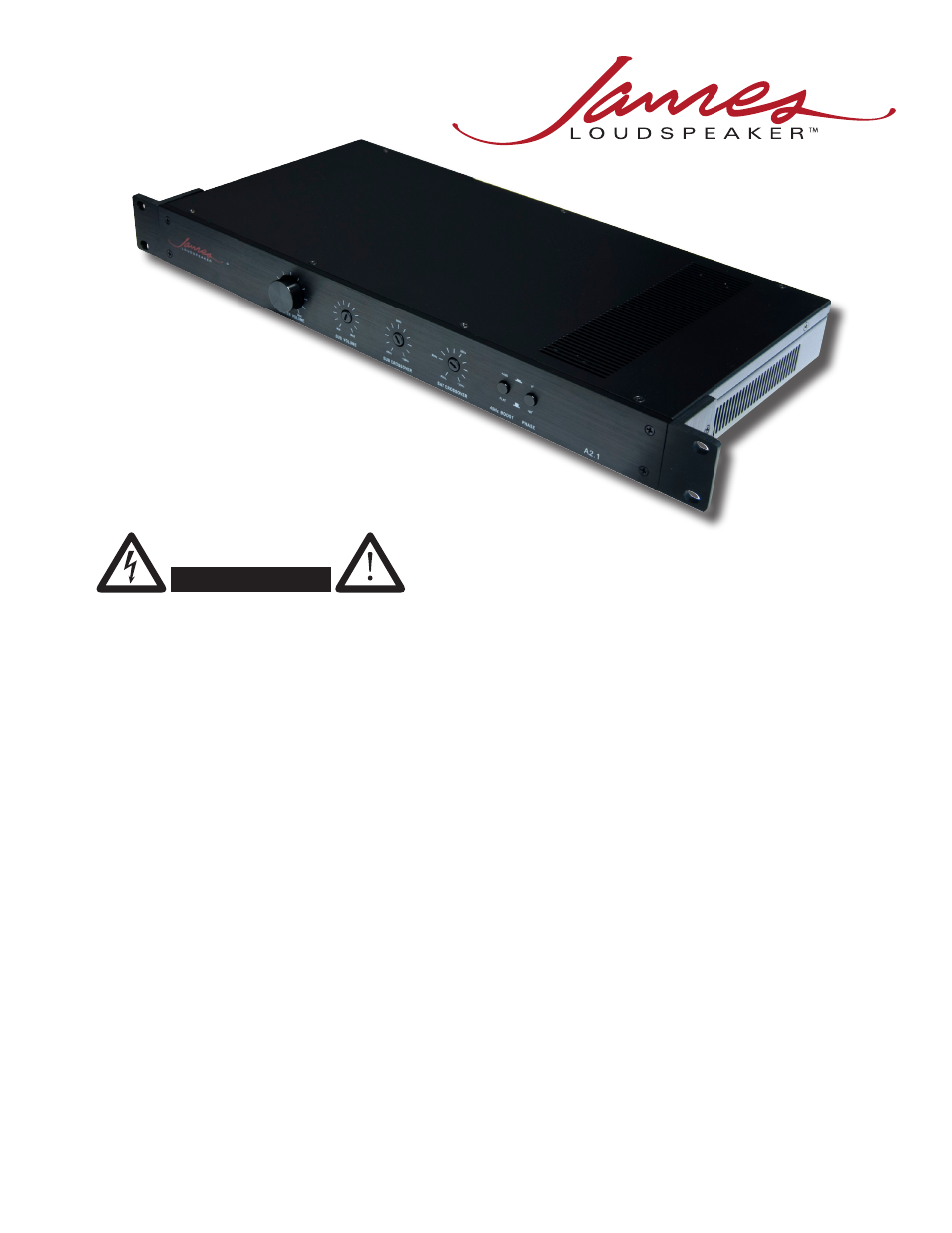James Loudspeaker A2.1 Amp User Manual
User manual, Caution, A2.1 amp

USER MANUAL
A2.1 AMp
CAUTION
RISK OF ELECTRICAL SHOCK
DO NOT OPEN
CAUTION: To reduce the risk of electric shock, do not remove cover (or back). No user-service-
able parts are inside. Refer servicing to qualified service personnel.
The lightning flash with arrowhead symbol is intended to alert the user to the presence of
uninsulated “dangerous voltage” within the products enclosure that may be of sufficient
magnitude to constitute a risk of electric shock to persons.
The exclamation point with arrowhead symbol is intended to alert the user to the presence of
important operating and maintenance (servicing) instructions in the literature accompanying
the subwoofer.
1. Read Instructions – All safety and operating instructions should be read carefully before
the subwoofer is operated.
2. Retain Instructions – The safety and operating instructions should be retained for
future reference.
3. Heed Warnings – All warnings on the subwoofer and in the operating instructions
should be adhered to.
4. Follow Instructions – All operating and use instructions should be followed.
5. Water and Moisture – The subwoofer should not be used near water – for example,
near a bathtub, washbowl, sink, laundry tub, in a wet or damp basement, near a
swimming pool, or the like.
6. Carts and Stands – The subwoofer should be used only with a cart or stand reco-
mmended by the manufacturer.
7. Wall or Ceiling Mounting – The subwoofer should be mounted to a wall or ceiling only
as recommended by the manufacturer.
8. Ventilation – The subwoofer should be situated so that its location or position does not
interfere with its proper ventilation. For example, the subwoofer should not be situated
on a bed, sofa, rug, or similar surface that may block the ventilation openings, or placed
in a built-in installation such as a bookcase or cabinet that may impede the flow of air
through the ventilation openings.
9. Heat –The subwoofer should be situated away from heat sources such as heating
radiators, heat registers, stoves, or other subwoofers or components that produce heat.
10. Power Sources – The subwoofer should be connected to a power supply only of the type
described in the operating instructions or as marked on the subwoofer itself.
11. Power Cord Protection – Power supply cords should be routed so that they are not
likely to be walked on or pinched by items placed upon them or against them, paying
particular attention to cords at plugs, convenience receptacles, and the point at which
they exit from the subwoofer.
12. Caution – To prevent electrical shock, match wide blade of plug to wide slot, fully
inserted.
13. Cleaning– The subwoofer should be cleaned only as recommended by the manufacturer.
14. Non-use Periods – The power cord of the subwoofer should be unplugged from the
outlet when it is left unused for extended periods of time.
15. Object and Liquid Entry – Care should be taken that objects will not fall and liquids will
not be spilled on the enclosure.
16. Damage Requiring Service – The subwoofer should be serviced by qualified personnel
when:
a. The power supply cord or plug has been damaged.
b. Objects have fallen or liquid spilled into the subwoofer.
c. The subwoofer has been exposed to rain.
d. The subwoofer does not appear to operate normally or exhibits a marked
change in performance.
e. The subwoofer has been dropped or damaged.
17. Servicing – The user should not try to service the subwoofer beyond what is described in
the operating instructions.
18. Overloading – Do not overload wall outlets, extension cords, or integral convenience
receptacles as this can result in a risk of fire or electrical shock.
19. Replacement Parts – When replacement parts are required, be sure the service techn-
cian has used replacement parts specified by the manufacturer or have the same charac-
teristics as the original part. Unauthorized substitutions may result in fire, electric shock,
or other hazards.
20. Safety Check – Upon completion of any service or repairs to this product, ask the service
technician to perform safety checks to determine that the product is in proper operating
condition.
All other servicing should be referred to qualified service personnel.